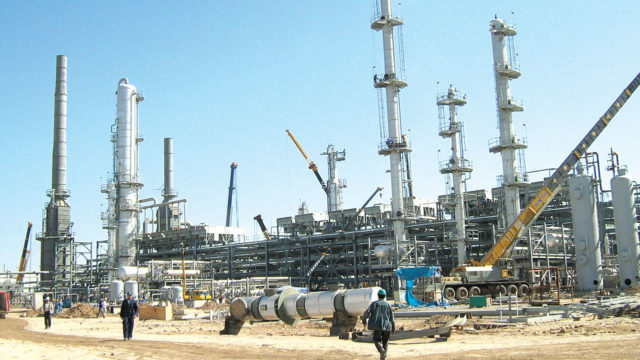… say it negates the spirit of net zero-emission and decarbonisation
Olusola Bello
Former officials of the Nigerian National Petroleum Corporation NNPC have flayed the Federal Government for advocating that people should invest in modular refineries in the country at a time when the whole world is talking about Net Zero emission and decarbonisation.
According to them modular refinery is not the solution to Nigeria’s fuel crisis and should not be encouraged because it will further deepen the climatic change crisis. Aside from that, they said modular refinery is not economical.
During the COP26 summit in Glasgow, President Muhammadu Buhari pledged Nigeria will cut its carbon emissions and reach net-zero by 2060, underlining the key role of gas in the country’s energy transition roadmap.
He explained that Nigeria is aware of the danger presented by climate change: “I do not think anyone in Nigeria needs persuading of the need for urgent action on the environment. Desertification in the North, floods in the centre, pollution and erosion on the coast are enough evidence. For Nigeria, climate change is not about the perils of tomorrow but what is happening today. Nigeria is committed to net-zero by 2060.”
Thomas John, former group managing director and Alex Ogedengbe, former managing director of Port Harcourt and Kaduna Refineries say the modular refinery projects are not for the future but rather for investors that want to keep the body and the soul together.
The duo who spoke at the 19th Annual Aret Adams Memorial Lecture Series 2022, titled Global Energy Transition Agenda: Nigeria’s preparedness? said that they are surprised at the tenacity with which the government is pursuing the issue of modular refinery despite the much talk about climatic change.
Alex Ogedengbe said given the global perception about climatic change, and Nigeria’s involvement in the project, he was surprised that it is modular refinery that the government is still talking about, instead of fashioning out strategies that would allow Nigeria to properly key into global energy transition.
He said: “At this stage when we are talking about using gas and renewable to replace some of our fuel needs, the government is encouraging people to build modular refineries. The action negates the spirit of energy transition being pursued globally”
He said over 50 licenses have been given for modular refineries so far, but only one or two of the companies are producing. He said even those two, none of them is producing petrol.
“If the government is to make any meaningful contribution to climate change, modular refineries and the bigger refineries should be reduced or scrapped. We have just had a crisis about fuel specifications that Nigeria uses, no modular refinery in Nigeria can produce petrol specification that Nigeria uses,” he said.
Thomas John in his comment said Federal Government does not mention modular refineries in the context of decarbonisation, stating further that modular refineries would definitely not help the Country in this period of energy transition.
He said the products of modular refineries are for today’s investors that want to keep body and soul together. It is not meant for the future. It has no place in the energy transition arrangement. He said diesel, low pour fuel oil they produce are also not for future
The two NNPC former directors spoke against the background of the federal government plans to issue 18 modular refineries licenses.
According to them, the use of fossil fuel is no longer in vogue and therefore modular refineries are no longer relevant in the scheme of things, especially now that the world is transiting to renewable and dropping fossil fuel.
The Federal Government had stated that it is planning to establish three modular refineries in each of the oil producing states, particularly in the Niger Delta region.
Going by the plan, the government would have to establish about 18 refineries in the country’s six major oil-producing states in the Niger Delta including Rivers, Bayelsa, Akwa Ibom, Delta, Edo and Cross River.
It said the objective was to halt the illegal artisanal refining activities going on in oil producing areas and their impacts on residents in the affected locations.
The Minister of State for Environment, Chief Sharon Ikeazor, had said: “In a bid to find alternative sources of livelihood for artisanal refiners and to encourage them to disengage completely from their illegal activities, the Federal Ministry of Environment in collaboration with the Office of the Senior Special Adviser to the President on Niger Delta Affairs and other critical stakeholders, are working on the establishment of three modular refineries per state in the oil producing areas as a pilot scheme to engage them (artisanal refiners).
“These modular refineries are intended to be 100 percent designed and manufactured in Nigeria using the expertise of government institutions such as the Ministry of Petroleum Resources, Federal University of Petroleum Effurun and Ahmadu Bello University Zaria.

